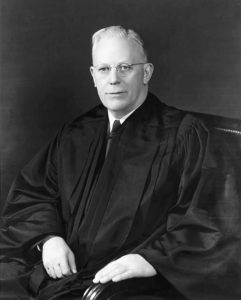
Earl Warren, left leaning Supreme Court Justice, ruled in favour of regulating private corporate speech to be fair to all sides.
The recent decision by the Trump administration to collect evidence of political bias at social media companies is to be welcomed. However it has led to gloating on the Left, and concerns on the Right about the legal issues. The First Amendment to the United States Constitution, it is said, prohibits interference by the Federal Government or by Congress. Rubbish! The Supreme Court has already upheld such legislation, and not even the recent, Conservative leaning Supreme Court but the Left-leaning activist Warren Court. I am speaking of course, of the FCC Fairness Doctrine (archive).
The Fairness Doctrine was a rule imposed on early, analog, radio broadcasters as well as television broadcasters. Because there were few radio television channels, they operated as gatekeepers to the national political conversation. As a result, over a number of cases the Federal Communications Commission (FCC) began treating them somewhat like utilities.
The Mayflower Doctrine was a ruling of the FCC in 1941 that radio stations were prohibited from editorialising in matters of news or politics for fear that they would otherwise simply be used to propagandise on behalf of Conservative business owners. It was superceded by the later, ‘Fairness Doctrine’. The rule required that broadcasters dealing with controversial issues present both sides, grant equal time to both sides and give those publicly criticised the opportunity to respond.
Eventually, a company called Red Lion Broadcasting challenged the rule and the litigation made its way to the Supreme Court. Which ruled unanimously in favour of the FCC. The full case name is, Red Lion Broadcasting Company, Incorporated, et al. v. Federal Communications Commission, et al. and the court’s opinion can be found here.
HELD (amongst other things) – The fairness doctrine and its specific manifestations in the personal attack and political editorial rules do not violate the First Amendment.
Why was such extreme control over editorial allowed? The Supreme Court said this – “(a) The First Amendment is relevant to public broadcasting, but it is the right of the viewing and listening public, and not the right of the broadcasters, which is paramount.”
The speech of the broadcasters is not what the First Amendment protects. The amendment protects the right of the viewing and listening public to hear multiple shades of opinion. The number of channels were limited and had to be used for the public good, not to serve the interests and political views of their owners.
In modern times, with the advent of cable television and digital broadcast over the airwaves, television channels are no longer so scarce and therefore no longer so restricted. There is ample competition. However social media today is the new scarce medium. Social media platforms tend towards small numbers of platforms with many members because everyone wants their content to reach as many people as possible. The same applies to websites like Wikipedia. If there is one encyclopaedia, why bookmark two?
Applying the same analysis to social media, we have a number of private companies which are alleged to be interfering with the public’s first amendment right to hear multiple opinions. Companies like Twitter are not just banning neo-Nazis who disagree with them but also individuals like Laura Loomer, a Conservative Jewish woman, feminists and mainstream right-wing opinions. Who made Jack Dorsey and Mark Zuckerberg determinists of acceptable speech? Who wants Mark Zuckerberg to be the determiner of acceptable speech? No one.
Leaving aside the obvious reasons already in case law, I say there is a more subtle reason to regulate social media to force them to allow unpopular speech. That is the tendency of echo-chambers to go to extremes. I do not agree with Tommy Robinson or Katie Hopkins. Usually. But even a broken clock can be right twice a day. I do not agree with Jeremy Corbyn, usually. He is however the leader of one of Britain’s major parties. Our society has become increasingly polarised and the only antidote is to force individuals to be confronted with alternative viewpoints. That is an imperative, which if ignored can only lead to social strife.
If I was legislating for this in the United Kingdom, I would create some mechanism accessible on the small claims track of the County Court for suing social media companies. There would be a sudden explosion of friendliness and accessibility in these companies’ customer services. The Silicon Valley oligarchs are not the Masters of the Universe, they are jumped up student politicians who need to be taught their place.

